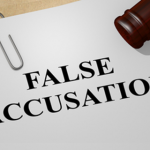What is the Offence of Perjury in New South Wales?

Perjury can be generally defined as knowingly telling an untruth during judicial proceedings when under a legal obligation to be honest.
It was a common law offence in New South Wales until abolished by section 341 of the Crimes Act 1900 (NSW) and codified in Part 7, Division 4 of that Act, which also contains a range of related criminal offences.
What is perjury?
Section 327 of the Act contains the offence of perjury.
It stipulates that a person who knowingly makes a false statement on oath during or connection with judicial proceedings, whether or not those proceedings have commenced or ever commence, regarding a matter that is material to those proceedings is liable to a maximum penalty of ten years’ imprisonment.
For a person to be found guilty of perjury, the prosecution must prove each of the following elements (or ingredients) beyond a reasonable doubt:
- A false statement was made,
- It was made under an oath or affirmation,
- It was made in, or in connection with, judicial proceedings,
- It concerned a matter which was material to those proceedings, and
- The maker knew the statement was false or did not believe it was true at the time it was made.
If the prosecution is unable to establish any of those elements, the defendant must be found not guilty.
A ‘judicial proceeding’ is broadly defined by section 311 as one which is in or before a judicial tribunal in which evidence may be taken on oath, which encompasses all courts and tribunals wherein judicial power is exercised.
Whether a matter is ‘material’ is a question of law, which means it must relate to the issues that are of importance to the proceedings.
Under section 328 of the Act, the maximum penalty for perjury increases to 14 years’ imprisonment where the prosecution is able to prove that the defendant committed the act with the intention to procure the conviction or acquittal of a person for a ‘serious indictable offence’ – which is one that carries a maximum penalty of at least five years in prison.
Alternative offences
Section 330 prescribes a maximum penalty of five years’ imprisonment for making a false statement on oath while knowing it to be false.
The offence is easier to prove than perjury because it does not require the statement to be material to the proceedings.
Section 329 makes section 330 a ‘statutory alternative’ to perjury, which means that a court which finds a defendant not guilty of perjury may instead find them guilty of making a false statement on oath if that offence is established by the evidence.
Section 331 contains the offence of making contradictory statements on oath, which provides that where a person charged with perjury is found to have made two statement on oath which irreconcilably conflict with one another, the person is to be found guilty of perjury if it is found that he or she knew one of the statements was false or did not believe it was true – even if it cannot be established which of the statement is false.
Section 333 makes it an offence for a person to procure, persuade, induce or otherwise cause another to perjure themselves.
The maximum penalty is seven years’ imprisonment, or 14 years where it is established that the defendant intended to procure the conviction or acquittal of a person charged with a serious indictable offence.
Section 336 prescribes a maximum penalty of five years’ imprisonment for anyone who makes a statement for an entry to a public registry, or makes the entry itself, for an improper purpose while knowing it to be false or misleading in a material way.
Limitations on prosecution
Section 338 places restrictions on commencing prosecutions for perjury offences.
It provides that a person is not to be prosecuted for the offence except by, or at the direction of, the Director of Public Prosecutions or with the leave of the court before which the perjury was alleged to have occurred.
If this is impossible or impractical, the prosecution may be instituted with the leave (permission) of the Supreme Court.
Can I prosecute someone for perjury?
It is possible in to commence private prosecutions for perjury in certain limited situations.
However, this requires the leave of the court in which the act was allegedly committed, and the applicant will normally be required to produce evidence of the offence before permission is granted, such as transcripts of the evidence and material that is inconsistent with that testimony.
If you have been charged with perjury, or believe another person has committed perjury in proceedings you are a party to, it is a good idea to contact an experienced criminal defence lawyer for case-specific legal advice and assistance.






